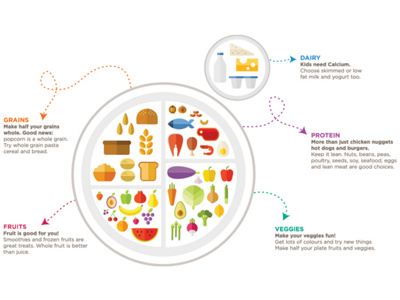Why is nutrition so important for kids?
When you give children good nutrition, you are giving them the nutrient building blocks that literally become the eyes you look into; the knees that get scraped; the bones that support their growing bodies; their inquisitive, curious brains; and the hearts that pump quietly night and day down through the years.
One of the most important factors that help in building the human immune system well from childhood is nutrition.
Proper nutrition of human beings starts by feeding them correctly when the mother is pregnant through good pregnancy nutrition.
An adequate supply of nutrients enables efficient growth which promotes the expression of genetic potential. A deficient diet may compromise the normal pace of growth and development. If poor nutrition occurs during the early stages of life and for long periods, the negative consequences will be permanent.
Carbohydrates constitute the major source of dietary energy in kids.
Proteins are essential for growth, tissue repair and enzyme activity.
Fats are a source of concentrated energy; they also serve as a vehicle for certain vitamins like A, D, E and K. Inadequate fat intake may lead to arrested development.
Calcium is a mineral and essential constituent of bones and teeth. It also plays a critical role in muscle and heart contraction, nervous irritability and blood clotting. Besides milk, all dairy products and green vegetables are a good source of calcium.
Iron is a very important component of haemoglobin. Foods with very high iron content are liver, heart, meats, beans, green vegetables and cereals.
Vitamins are organic compounds essential to normal growth and development and for body functioning.
What are the health implications of not following proper nutritional guidelines?
- Healthy eating is associated with reduced risk for many diseases, including several of the leading causes of death: heart disease, cancer, stroke, and diabetes
- Healthy eating in childhood and adolescence is important for proper growth and development and can prevent health problems such as obesity, dental caries, iron deficiency, and osteoporosis
- A poor diet can lead to energy imbalance (e.g., eating more calories than one expends through physical activity) and can increase one’s risk for being overweight and obese
- A poor diet can increase the risk for lung, oesophageal, stomach, colorectal, and prostate cancers
- Children who eat fast food one or more times per week are at increased risk for weight gain, being overweight or obese
- Drinking sugar-sweetened beverages can result in weight gain
- Providing access to drinking water gives children a healthy alternative to sugar-sweetened beverages
- Hunger and food insecurity might increase the risk for lower dietary quality and under nutrition. In turn, under nutrition can negatively affect overall health, cognitive development, and school performance
Recommended foods to include in their diet?
It’s hard to compete against fast-food kids’ meals – salty, fatty food, served quickly, in a bright, exciting place – and they come with toys! It’s no wonder trips to fast-food restaurants have become the pinnacle of gastronomic delight for most pre-school children.
Children do need whole grains. They do need fresh fruits and fresh vegetables. They do need a source of calcium for their growing bones. They do need healthy sources of proteins, either from fish, poultry, eggs, and meat, or from plant sources. These foods give them the vitamins, minerals, and micronutrients they need to build high-quality bodies.
Children do not need to eat large amounts of sugar, refined white flour and fat
What can parents can do to encourage them to follow a healthy diet?
Parents have a great influence on their children’s eating habits and food choices, so make sure you are a good example when choosing your food and what you offer to your child. The five greatest motivators for children to eat healthy foods are:
- Imitation. If the food in the house is healthy, kids will pick their favourites from among healthy choices.
- Tasty choices. Try to make a variety of tasty healthy food they like; the younger you start, the quicker they will develop their tastes in healthy direction.
- Fun presentation. Try to make the meal time fun and interesting for your child. Pre-school children often love food that is shaped like something interesting--a face, a clown, a dinosaur, a favorite hero, etc…so try to organise their dishes with healthy food in the way they like.
- When all else fails, sneak it in. Make whole wheat bread, carrot muffins. Add shaved vegetables or pieces of fruit to virtually any baked food.
This isn't to suggest that the battle is an easy one but is worthwhile, and it can certainly be fun. The battle should never be with your kids. Never push. Entice them, persuade them, and teach them.


